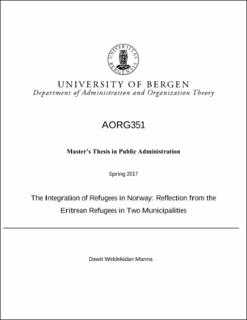The Integration of Refugees in Norway: Reflection from the Eritrean Refugees in Two Municipalities
Master thesis
Permanent lenke
https://hdl.handle.net/11250/3036927Utgivelsesdato
2017Metadata
Vis full innførselSamlinger
- Department of Government [473]
Sammendrag
The influx of refugees into Europe, Scandinavia, and Norway and the challenges that came along on how to integrate them into the host communities has been at the front-and-center of public and media debates in recent years. As part of that, this study initiated to explore the integration of Eritrean refugees in two municipalities in Norway and identify the challenges they have had during the process. To accomplish this objective; the study adopted a qualitative approach. Accordingly, an in-depth interview with the Eritrean refugees, local people, refugee guides and key informants has been carried out. Besides, focus group discussions were conducted with two groups of Eritrean refugees from the two Municipalities.
The study revealed that the refugees have several barriers that hinder them from achieving the expected progress in the integration program. The main obstacles identified by the Eritrean refugees in their integration process include: inadequate personal efforts, language, cultural differences, inability to find employment, health issues, separation from their families and friends, traumas they experienced during their journeys, views expressed by right-wing politicians and the role of the media outlets, has been identified by the refugees as obstacles for their integration. However, from the response of the study participants, the author is fairly convinced that by far the most important barrier among those mentioned is the insufficient personal initiative on the part of individual refugees. Having said that, other studies about barriers to integration shows gaps in the literature, and therefore, each of the barriers identified in this research needs to be studied further.
